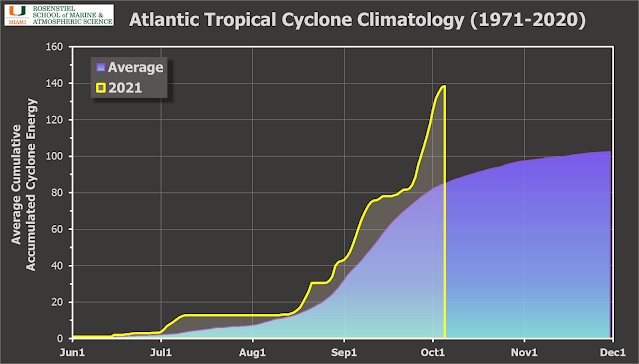Hurricane Sam finally transitioned to a powerful extratropical cyclone on Tuesday morning, and no other tropical cyclones are active or brewing. Through today, there have been 20 named storms in the Atlantic this season, including 7 hurricanes and 4 major hurricanes. Of those four major hurricanes (Category 3+), two made landfall at their peak intensity: Grace and Ida.
Sam ended up producing an astounding 53.8 ACE (Accumulated Cyclone Energy) units, which singlehandedly accounts for 39% of the season's total so far! It also clinched 5th place for most energetic storm in the Atlantic (during the reliable satellite era, and pending any post-season reanalysis tweaks to its intensity). This table shows the new Top 10 list, using storms from 1966-2021.
Also during the satellite era, which is conventionally defined as 1966 onward, very few seasons have had as much ACE accrued by October 5th as the 2021 season: 1995, 2003, 2004, 2005, and 2017... all high-end infamous hurricane seasons. ACE is a metric that doesn't depend on the number of named storms, only the overall intensity and duration of whatever storms form.
The only name remaining on the regular list is Wanda, then we would move into the new auxiliary list that replaced the Greek alphabet. I shared this list of names in my post on September 28th, but here it is again as a refresher:
October can still be a potent month for hurricanes, so it's absolutely too soon to tune out the tropics. Category 5 hurricanes such as Mitch '98, Wilma '05, Matthew '16, and Michael '18 occurred during October. Sandy '12 was also born in the western Caribbean in late October and reached peak intensity as a Category 3 hurricane when it made landfall in eastern Cuba.
As we see in this map of climatological hurricane activity, south Florida is especially at risk during October due to the prevailing steering patterns and preferred formation zones. And unlike the long-track storms of African pedigree, storms that form in the western Caribbean Sea or Gulf of Mexico naturally give less lead-time for impacts.
- Visit the Tropical Atlantic Headquarters.
- Subscribe to get these updates emailed to you.
- Follow me on Twitter





No comments:
Post a Comment